Margaret Thatcher: View from the entertainment world
- Published
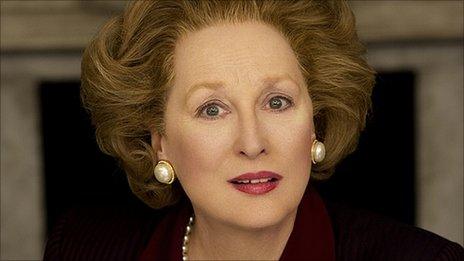
Meryl Streep called her "a pioneer, willingly or unwillingly, for the role of women in politics".
Figures from the arts and entertainment world have given their reaction to the death of Baroness Thatcher who has died at the age of 87 following a stroke.
The former Prime Minister was famously played by Meryl Streep who won an Oscar for her performance in The Iron Lady.
In a statement, Streep called her "a figure of awe for her personal strength and grit".
Artist Richard Stone, who painted her on several occasions, said: "Her kindness is my abiding memory of her."
Here are a selection of reactions.
Meryl Streep, actress
Margaret Thatcher was a pioneer, willingly or unwillingly, for the role of women in politics.
It is hard to imagine a part of our current history that has not been affected by measures she put forward in the UK at the end of the 20th Century. Her hard-nosed fiscal measures took a toll on the poor, and her hands-off approach to financial regulation led to great wealth for others. There is an argument that her steadfast, almost emotional loyalty to the pound sterling has helped the UK weather the storms of European monetary uncertainty.
But to me she was a figure of awe for her personal strength and grit. To have come up, legitimately, through the ranks of the British political system, class bound and gender phobic as it was, in the time that she did and the way that she did, was a formidable achievement.
To have won it, not because she inherited position as the daughter of a great man, or the widow of an important man, but by dint of her own striving.
To have withstood the special hatred and ridicule, unprecedented in my opinion, levelled in our time at a public figure who was not a mass murderer; and to have managed to keep her convictions attached to fervent ideals and ideas - wrongheaded or misguided as we might see them now - without corruption, I see that as evidence of some kind of greatness, worthy for the argument of history to settle.
To have given women and girls around the world reason to supplant fantasies of being princesses with a different dream: the real-life option of leading their nation; this was groundbreaking and admirable.
I was honoured to try to imagine her late life journey after power; but I have only a glancing understanding of what her many struggles were, and how she managed to sail through to the other side. I wish to convey my respectful condolences to her family and many friends.
Steve Nallon, impressionist on Spitting Image
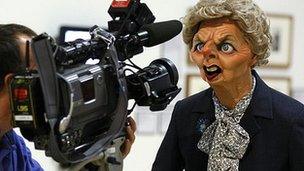
Steve Nallon voiced Baroness Thatcher on ITV satirical comedy Spitting Image
Speaking to the BBC last year, Nallon said: "I used to do a question and answer with the audience - I had no act, I just dressed as Thatcher and went out to take questions. So, the difficulty, once I'd got the voice, was to know everything about her.
If I went on Mastermind, [she] would be my specialist subject.
I think with Thatcher, you either loved her or hated her. She was either a figure of fun or an iconic hero but the truth is always more complicated. Looking back now, perhaps her legacy is Tony Blair rather than David Cameron. The fact that nobody dismantled politically what she achieved.
Richard Stone, artist
I painted Lady Thatcher six times. Her kindness is my abiding memory of her, and her thoughtfulness. She was lovely and she was also the perfect sitter, that's what comes out. Sittings were at her home, at her office in the House of Lords and in my studio.
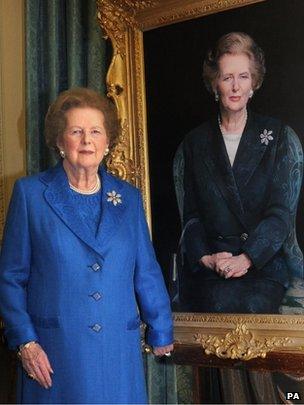
Richard Stone painted Margaret Thatcher six times
My wife is brilliant at keeping an archive - she's pulled out some notes I made about painting her. She last sat for me in 2009 for the official Downing Street portrait commissioned by Gordon Brown, as well as a portrait for the Reagan Presidential Library in California.
Here is what I wrote:
"I do hope that the light in here is alright for you," inquired Lady Thatcher, extending a hand to greet me. She listened attentively while I explained how I hoped the sittings would progress. It was clear she wanted to give of her best and be a good sitter. With some minor adjustments to the room, a comfortable chair was positioned to allow the light to fall gently across her face. Coffee was summoned and the first of many enjoyable sittings began.
For me it was the beginning of a new adventure. Margaret Thatcher had been such an influential Prime Minster, much revered by my family and an inspiration to many of my generation. Her reputation was well-known, as was her appearance from countless photographs and caricatures. I started work on the portrait a few days after meeting her for the first time.
Not just wanting to record a superficial likeness, I needed to capture something of the strength and determination that a nation has always attributed to her. The trademark blue suit, the ubiquitous handbag not far from her side and the perfect coiffure succinctly enshrined the public perception of the country's first lady prime minister. .
With a ramrod-straight back and hands neatly clasped in her lap, we gradually broke into conversation. There was talk of the Brighton Bombing, the Falklands War, her friendship with Ronald Reagan and most surprisingly, traditional home cooking.
Memories of the Falklands took an emotional turn with a catch in her voice recalling the lists of casualties which brought the reality of the conflict fought far away back home. Recollections of the SAS invasion strategy were graphically illustrated over the tea table with the cups and saucers, sugar bowl, milk jug and teapot used as landmarks to describe the scene.
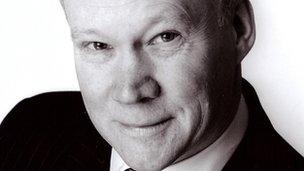
Richard Stone remembers Baroness Thatcher's kindness as well as her strong opinions
At times the conversation was vigorous with robust opinions expressed, giving me moments to see the fire still behind the eyes. Although each sitting would be an hour and a half in length, time would fly as I flung paint on the canvas. Often oblivious to an agitated secretary wanting to draw things to a close, our time together would regularly over-run. On many occasions when I was tired from the intense concentration, I would be invited to stay on for a drink to relax and continue our conversation.
After time, there emerged a softer, more tender aspect to the Iron Lady. She would ask questions and listen carefully to my considered responses. It was at moments such as these, that I was able to see a more sensitive side that I felt was necessary to allude to in the portrait. There emerged a different woman with a kindness, a good humour and indeed a gentleness that was not revealed in the painting. Although the picture was practically finished, I was about ready to start all over again, as I now felt I knew her as she really was.
Whilst I had invited Lady Thatcher to view the work as it evolved, she made it clear that she would prefer to see it only on completion. When the work was finished, she stood quietly contemplating her image, placing a hand up to her pearl necklace and considering her words carefully. She remarked: "It is how one would like to be remembered."
Alexei Sayle, comedian
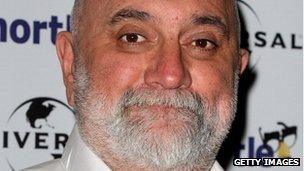
Sayle was a central part of the alternative comedy circuit of the early 1980s
I've just gone back to stand-up after 17 years and I start the routine which mentions her, so I'm going to have to change it now, which is annoying. It won't necessarily work anymore - I've been inconvenienced massively.
She was a gift for comedians and she helped my career. There was a large educated audience out there that hated her, so you could get an easy ride just shouting: "Thatcher - what a bastard" for 20 minutes. She was such a polarising figure that it provided a great opportunity.
She was humourless as well. She represented a lot of things I suppose the target audience hated.
I think she was a pretty bad thing really. It's not to say that certain structural changes - you know the things that were going to change about Britain were going to change anyway - but they could have been done perhaps with a different individual in a less vindictive, ham-fisted clumsy way.
She made a conscious decision to run down manufacturing and concentrate on two areas which were arms manufacture and financial services - I wonder in some ways if having financial services and arms manufacturing at the core of your country kind of corrupts you morally, you know it's kind of like robbing people or killing them. It's not very healthy is it really.
This idea that she was a great reformer in a sense she was a great destroyer. She wasn't a reformer.
Morrissey, musician
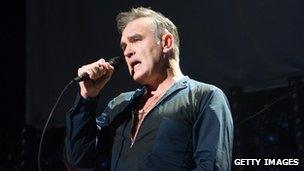
Tracks by the former Smiths singer include Margaret on the Guillotine
Thatcher is remembered as The Iron Lady only because she possessed completely negative traits such as persistent stubbornness and a determined refusal to listen to others.
Every move she made was charged by negativity; she destroyed the British manufacturing industry, she hated the miners, she hated the arts, she hated the Irish Freedom Fighters and allowed them to die, she hated the English poor and did nothing at all to help them, she hated Greenpeace and environmental protectionists, she was the only European political leader who opposed a ban on the Ivory Trade, she had no wit and no warmth and even her own Cabinet booted her out.
She gave the order to blow up The Belgrano [during the Falklands War] even though it was outside of the Malvinas Exclusion Zone - and was sailing AWAY from the islands.
When the young Argentinean boys aboard The Belgrano had suffered a most appalling and unjust death, Thatcher gave the thumbs up sign for the British press. Iron? No. Barbaric? Yes.
She hated feminists even though it was largely due to the progression of the women's movement that the British people allowed themselves to accept that a prime minister could actually be female. But because of Thatcher, there will never again be another woman in power in British politics, and rather than opening that particular door for other women, she closed it.
Thatcher will only be fondly remembered by sentimentalists who did not suffer under her leadership, but the majority of British working people have forgotten her already, and the people of Argentina will be celebrating her death.
As a matter of recorded fact, Thatcher was a terror without an atom of humanity.
Peter Morgan, writer
Morgan is the writer of The Audience, the play starring Dame Helen Mirren which imagines the private meetings between Queen Elizabeth II and her prime ministers during her 60-year reign.
After introducing himself to the audience at the Gielgud Theatre on the evening of 8 April, just before the show began, Morgan said: "Today one of the great figures of post-war British political life and the longest serving prime minister of the 20th Century, and therefore the participant of the greatest number of the audiences with the queen, died. I just wanted to mark that occasion this evening with you all of you."
Stephen Fry, broadcaster
Was in the air when the news came in about Margaret Thatcher. Such a force in Britain through my university days through to my 30s.
Anita O'Brien, curator at London's Cartoon Museum
Initially I think she was quite difficult for cartoonists to get a handle on… visually it takes them a while to get a character and what they stand for.
I'm waiting to see what anti-Thatcher Guardian cartoonist Steve Bell's going to do this week because this will be the last hurrah of Margaret Thatcher. I'm sure he'll make a special effort in whatever he does.
She was probably the first prime minister to have such a conscious sense of how the media were portraying her and really worked on that to make herself more attractive to the public.
- Published8 April 2013
- Published4 January 2012
- Published4 January 2012